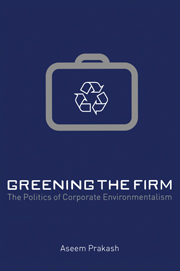Book contents
2 - Environmental policymaking within firms
Published online by Cambridge University Press: 22 September 2009
Summary
This book seeks to understand why firms selectively adopt Type 2 policies. At a broader level, it examines the evolution a specific genre of institutions – firm-level environmental policies. To explore the research question, it departs from neoclassical economic theory and employs a new-institutionalist perspective. Instead of treating firms as unitary actors, it views them as composites consisting of multiple managers. The ultimate unit of analysis is the individual manager within the firm.
Managers may have different preferences for Type 2 environmental policies: some – policy supporters – prioritize environmental objectives over a simple effort to maximize quantifiable profits while others – policy skeptics – do not. Once we acknowledge that some managers may pursue environmental objectives that do not or cannot meet the (quantifiable) profit criteria, firms' policies can no longer be explained as their passive responses to external stimuli, in particular, market signals and governmental regulations. Rather, policies also reflect intra-firm dynamics and it is difficult to predict ex ante whether policy supporters or policy skeptics will always prevail. The final outcome depends on a variety of factors such as policy supporters' hierarchical position, their persuasive or canvassing abilities, their expertise in the issue area, and how they invoke external factors to shape perceptions of policy skeptics. Policy outcomes are also influenced by the degree of organizational change required for the policy implementation: the greater the predicted change, the stronger the incentives are for the “losers” to oppose policy adoption. Consequently, the likelihood of policy adoption decreases.
- Type
- Chapter
- Information
- Greening the FirmThe Politics of Corporate Environmentalism, pp. 16 - 33Publisher: Cambridge University PressPrint publication year: 2000



